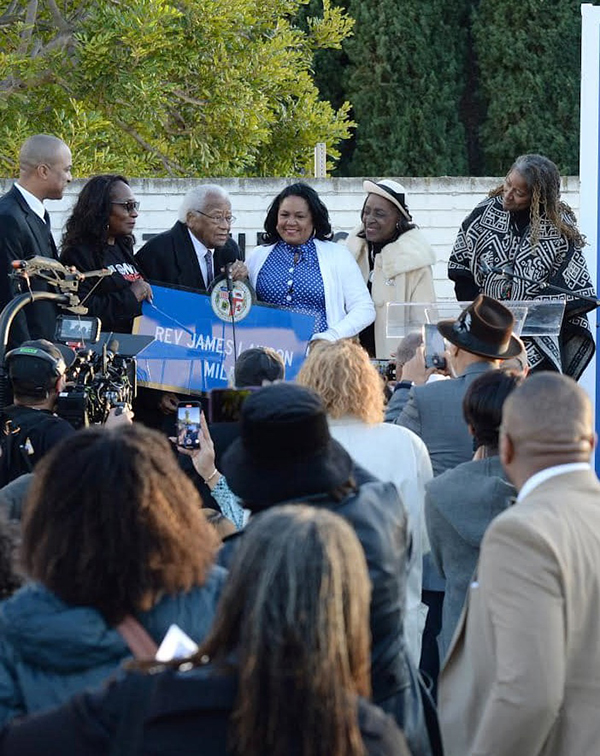By Shirley Hawkins
Contributing Writer
SOUTH LOS ANGELES — Legendary civil rights leader the Rev. James M. Lawson was honored Jan. 11 when a blue and white street sign was unveiled in his honor on the lawn of Holman United Methodist Church.
Adams Boulevard between Crenshaw Boulevard and Arlington Avenue will now be known as the “Rev. James Lawson Mile.”
The unveiling of the sign at the church where Lawson was the pastor from 1974 to his retirement in 1999 was preceded by a march from the intersection of Adams and Crenshaw boulevards, the western end of the mile, to Arlington Avenue, its eastern end.
“Despising human beings can never cause the world to become a better place,” the 95-year-old Lawson said at the unveiling. “The United States must learn that. I hope we will not learn that the hard way.”
A timeline of Lawson’s extensive life and career was also on display, which chronicled his participation in the nonviolence and civil rights movements as well as his years as pastor at Holman United Methodist Church.
“I’m excited and honored to have the privilege to be with you here today as we celebrate a true civil rights icon, a community member, a builder and activist, Rev. James M. Lawson,” said KBLA radio host Dominique Diprima, who served as mistress of ceremonies.
Attending the unveiling were Hutt, Wheeler, county Supervisor Holly J. Mitchell, MTA Director Jackie Dupont-Walker and Holman minister the Rev. Ken J. Walker.
“This sign stands for everyone,” Rev. Walker said. “This sign stands for all people, all races, all nationalities, all genders, all persuasions, because this sign stands for love of all humanity.”
Leaning on a walker as he approached the microphone, Lawson smiled broadly.
“Thank all of you for being here and I want to thank all of you who made this happen,” he said.
“I’m deeply grateful. My wife and I are very glad this is happening, though it surprised us.
“As we started out 65 years ago, we didn’t anticipate this. We expected jail. We expected mobs that wanted to overrun us. We expected the loss of dear friends and colleagues in the struggle. We also attracted the joys of accomplishment.”
Lawson was one of the active participants in the civil rights movement and he spoke about that period during his remarks.
“Between 1953 and 1973, a nonviolent movement took place in the United States that pushed this great nation of ours to social, political, economic, spiritual, moral change in which people were at the very center,” he said. “These days, you must not forget that. Someone needs to mention that it can be done nonviolently. It cannot be done with violence. Despising human beings can never cause the world to become a better place and I hope we will not learn it the hard way.
“I’ve been arrested in L.A., Washington, D.C., Orlando, Florida, Cleveland, Ohio, Nashville Tennessee, Jackson, Mississippi, and across this nation organizing social movements for equality, liberty [and] justice for all,” he added.
“You cannot counter violence with anger and violence. It can only be conquered through compassion and non-violence. Non-violence is the only way. Compassion is the only way. Justice is the only way. We must learn that lesson. I hope we will not wait too long to learn it.”
Throughout his life, Lawson fought tirelessly for civil rights. The lifelong practitioner of non-violence, he was a close friend and associate of the Rev. Martin Luther King Jr.
“I first met Reverend Lawson in 2017 when he was at FAME Church and he spoke about the March on Washington,” Hutt said. “It was there that I truly understood the work of those who constructed the movement.
“They did not have the advanced technology that we have today, but in a matter of weeks, they were able to put together sit-ins, protests, marches, mobilizing thousands of people to forge a path towards change. This commitment became a powerful catalyst proving that human connection and shared purpose can transcend the limitations of any battle,” she added.
“Rev. Lawson embodies these lessons, he influenced so many by carrying out this work that he truly lived by. He embodies so many lessons and he influenced so many. He selflessly sacrificed so that today we can embrace a society that understands that no good comes from violence, hate or any crime.
“And as we give Rev. Lawson his flowers and unveil the Rev. James Lawson Mile, let’s hold ourselves to continue this lesson and brave the way for a brighter and more united and future for us all,” Hutt added.
Mitchell, a member of Holman United Methodist Church, spoke of her introduction to social justice primarily through the teachings of Rev. Lawson.
“I would not be a student of Reverend Lawson if I didn’t remind us of what happens when we don’t show up and show out,” Mitchell said. “We must acknowledge the miles that he has walked throughout the course of his entire life to create opportunities for me and for all of you. As we see his name on that sign, we must recommit to ourselves what we are going to do to continue the fight, which clearly is far from over in that fundamental human rights are being taken away from us each and every day.
“(It is) a fight that I’m sure Reverend Lawson thought was in his rearview mirror and yet is in front of us everyday. We have to march, we have to vote, and we have to take as many people with us as we possibly can.
After the ceremony, the film “Rustin,” about civil rights leader Bayard Rustin, was shown inside the church.
City News Service contributed to this story.











